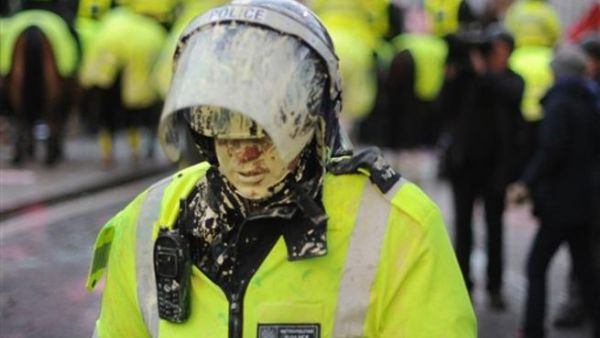A YOUNG Bahrain woman has spoken of her terror after being injured in London's worst student rioting for a decade. University of Arts student Christina Lunn was among thousands of people peacefully protesting outside parliament against plans to nearly treble tuition fees.
Thursday's demonstration began peacefully, but ended in violence with more than 30 arrested and around 60 protesters and police officers injured.
Ms Lunn, 20, claimed to have been struck in the face with a baton, as riot police moved in to break up the protesters in Parliament Square.
"Riot police arrived and started moving in waves of about 30 through the crowd after the horses, batons flying around heads and faces," she said.
"I was pulled off the railings into the sea of people and, as instructed by the National Union of Students, put my hands on my head to avoid confrontation.
"I wanted to get out, I wanted to be peaceful. What I got was a swift truncheon to the face.
"I had thrown nothing, I had done nothing, other than show up, march, sit, exercise my right to stand up for what I believe in.
"After that I fell behind the police lines as they pushed on and there was no way back in.
"Next to me was a 17-year-old with blood pouring from his forehead and nose, lying on the ground with his friend trying to stop the bleeding with a newspaper."
The former St Christopher's School pupil claimed until that moment most protesters had merely been sitting in the square.
"The police, however, were not as peaceable and started pulling people up and roughly shoving them backwards," she said.
"This naturally incited anger and parts of the crowd became aggressive.
"People started rushing forward trying to break free and were met with a charge of horses, batons flying.
"I managed to cling onto some railings to avoid getting trampled by the surge.
"The charges were repeated trying to push us back, however, where they wanted us to go was beyond me, as a similar situation was blocking us at the other end of the street.
"Students at the very front were battered and bleeding from the beating they received while trying to get away.
"It was carnage, of people, morals, hope and respect.
"It was one of the most disgusting and immoral things I have ever witnessed."
Ms Lunn said the police tactic of "kettling" ensured no one left the square, as temperatures dropped to -1C, leaving the protesters tired, cold and hungry.
Prior to that, she said everything had been fun and peaceful.
"There was dancing, singing, chanting and a general atmosphere of goodwill and change," she said.
"We reached the edge of Parliament Square incident-free."
The violence was sparked after the coalition government narrowly voted to raise university tuition fees in England from 2012.
The basic level of fees will now climb to 6,000 (BD3,568), with an upper limit of 9,000 (BD5,449) well above the previous cap of 3,290 (BD1,992).
A Rolls Royce carrying Prince Charles and his wife Camilla was also attacked during Thursday's demonstrations.
Protesters surrounded the vehicle and kicked the doors, cracking a window and threw white paint on the vehicle.
One person also reportedly managed to push a stick through an open window and jab Camilla in the ribs as people shouted "Off with their heads".
However, despite the violence Ms Lunn feels the protesters have been misrepresented in the media.
"Our protest did not begin at 4pm with missiles being thrown at placid lines of police," she said.
"It started at noon with a march, a rally, some dancing and a sit-in.
"The media are dining out on the officers injured, but what about the hundreds of protesters brutalised at the hands and batons of the police?
"It has been called a black day for education. It was a black day for far more than that.
"It was a black day for a basic human right, for peaceful protest."
Ms Lunn said she was drawn to the protest out of the conviction that education should be a right not a privilege.
"I believe education is a right that should be available to all, not just those who can afford it," she said.
"Once spending costs on education are cut universities will have to cut many costs themselves, one of which is contact time with lecturers.
"While I am an international student my fees will remain the same, however I will end up paying the same amount for less teaching time."








